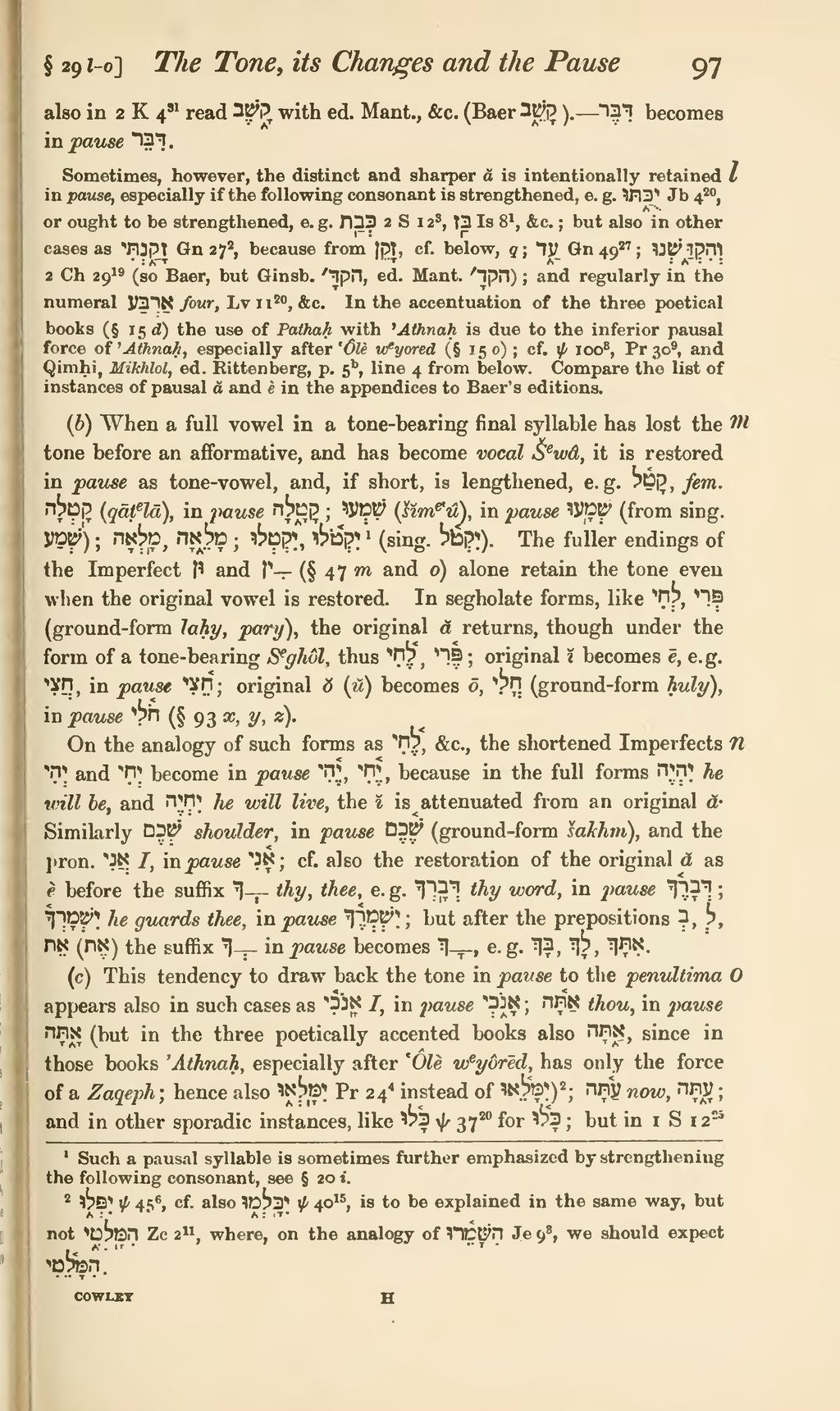also in 2 K 431 read קָשֶׁב with ed. Mant., &c. (Baer קָשֵָׁב).—דִּבֶּר becomes in pause דִּבֵּר.
[l] Sometimes, however, the distinct and sharper ă is intentionally retained in pause, especially if the following consonant is strengthened, e.g. יֻכַּ֑תּוּ Jb 420, or ought to be strengthened, e.g. כְּבַֽת 2 S 123, בַּֽז Is 81, &c.; but also in other cases as זָקַ֑נְתִּי Gn 272, because from זָקֵן, cf. below, q; עַ֑ד Gn 4927; וְהִקְדַּ֑שְׁנוּ 2 Ch 2919 (so Baer, but Ginsb. הקדָּ׳, ed. Mant. הקדָ׳); and regularly in the numeral אַרְבַּע four, Lv 1120, &c. In the accentuation of the three poetical books (§ 15 d) the use of Pathaḥ with ʾAthnaḥ is due to the inferior pausal force of ʾAthnaḥ, especially after ʿÔlè weyored (§ 15 o); cf. ψ 1008, Pr 309, and Qimḥi, Mikhlol, ed. Rittenberg, p. 5b, line 4 from below. Compare the list of instances of pausal ă and è in the appendices to Baer’s editions.
[m] (b) When a full vowel in a tone-bearing final syllable has lost the tone before an afformative, and has become vocal Šewâ, it is restored in pause as tone-vowel, and, if short, is lengthened, e.g. קָטַ֫ל, fem. קָֽטְלָה (qāṭelā), in pause קָטָ֑לָה; שִׁמְעוּ (šĭmeʿû), in pause שְׁמָֽעוּ (from sing. שְׁמַע); מָֽלְאָה, מָלֵאָ֑ה; יִקְטְלוּ, יִקְטֹ֫לוּ[1] (sing. יִקְטֹ֫ל). The fuller endings of the Imperfect וּן and ־ִין (§ 47 m and o) alone retain the tone even when the original vowel is restored. In segholate forms, like לְחִי, פְּרִי (ground-form laḥy, pary), the original ă returns, though under the form of a tone-bearing Seghôl, thus לֶ֫חִי, פֶּ֫רִי; original ĭ becomes ē, e.g. חֲצִי, in pause חֵ֫צִי; original ŏ (ŭ) becomes ō, חֳלִי (ground-form ḥuly), in pause חֹ֫לִי ( 93 x, y, z).
[n] On the analogy of such forms as לֶ֫חִי, &c., the shortened Imperfects יְהִי and יְחִי become in pause יֶ֫הִי, יֶ֫חִי, because in the full forms יִהְיֶה he will be, and יִחְיֶה he will live, the ĭ is attenuated from an original ă. Similarly שְׁכֶם shoulder, in pause שֶׁכֶם (ground-form šakhm), and the pron. אֲנִי I, in pause אָ֫נִי; cf. also the restoration of the original ă as è before the suffix ־ְךָ thy, thee, e.g. דְּבָֽרְךָ thy word, in pause דְּבָרֶ֫ךָ; יִשְׁמָרְךָ֫ he guards thee, in pause יִשְׁמְרֶ֫ךָ; but after the prepositions בְ, לְ, (אֶת) אֵת the suffix ־ְךָ in pause becomes ־ָךְ, e.g. בָּךְ, לָךְ, אִתָּךְ.
[o] (c) This tendency to draw back the tone in pause to the penultima appears also in such cases as אָֽנֹכִ֫י I, in pause אָנֹ֑כִי; אַתָּ֫ה thou, in pause אָ֑תָּה (but in the three poetically accented books also אַ֑תָּה, since in those books ʾAthnaḥ, especially after ʿÔlè weyôrēd, has only the force of a Zaqeph; hence also יִמָּֽלְא֑וּ Pr 244 instead of יִמָּלֵ֫אוּ)[2]; עַ֫תָּה now, עָ֑תָּה; and in other sporadic instances, like כָּ֫לוּ ψ 3720 for כָּל֫וּ; but in 1 S 1225
